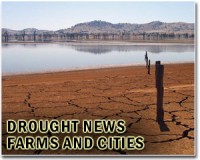| . |  |
. |
Damascus (AFP) June 22, 2010 A severe four-year drought is devastating Syria's rural communities, forcing them to abandon the country's traditional breadbasket in the northeast for cities in search of employment. Earlier this month, the World Food Programme started delivering food aid to nearly 200,000 people in the provinces of Al-Hasakeh, Al-Raqqa and Deir Ezzor, areas worst hit by the drought. The WFP says tens of thousands of the most vulnerable families have benefited from the food aid programme. But due to low levels of funding, the UN food agency says 110,000 people are still in need. "The situation is really bad" in northeast Syria, said WFP official Selly Muzammil. It is the second time that food aid has been distributed in Syria since the United Nations initiated a plan last year to combat the drought in afflicted areas. The situation has triggered a mass exodus of people to urban areas in search of work. The UN estimates more than a million people have left the northeast for urban centres, with farmers simply not cultivating enough food or earning enough money to sustain them. One of them, Myassar Darwish al-Hussein, 22, came to Damascus from Deir Ezzor with his family three months ago, and found a job in a factory where he earns less than 200 dollars a month. In Deir Ezzor, "the crop yield has fallen by 70 percent," he said. His brother stayed behind to continue farming wheat and sugar cane. But, as Hussein explains, the situation is particularly difficult because, on top of the drought, fuel prices have shot up after the government's decision to start phasing out state subsidies on basic commodities. Wheat production, seen as one of Syria's key strategic resources, is believed to have fallen this year to 2.4 million tonnes, down from 4.1 million in 2007, while domestic consumption has risen to 4.0 million tonnes annually, according to the ruling party's newspaper Al-Baath. "We are going to import wheat for the third consecutive year," the daily said last week. The government has responded with urgent measures, including the rescheduling of loans and tax exemptions for investment projects. Deputy prime minister for economic affairs Abdallah Dardari announced on Saturday the decision to double public investment in Deir Ezzor to 21 billion Syrian pounds (450 million dollars) over the coming five years. Dardari appealed to the private sector to match public investment in the region and announced the construction of a one-billion-euro (1.25 billion dollars) dam expected to irrigate 30,000 hectares (74,000 acres) of land. "Deir Ezzor was... green. Today, it is completely dried out, the fields resemble the desert, the Khabour river is dry," lamented a retired army officer who has lived near Damascus for 33 years. He said he was "scared" by the number of people who have fled their vulnerable circumstances in search of a better life in Damascus and Daraa to the south. Two months ago Shirouane left his village Al-Dirbassiye, in the northeastern province of Qamishli, after another disappointing wheat and cotton harvest, and moved to Damascus, where he became a taxi driver. But he is well aware of the problems created by urban migration in Syria. "If we do not produce anything, we will have no revenues," he said. In a letter published in the official Syrian press, the governor of Al-Hasakeh called on the authorities to reschedule loans to farmers for 2009-2010 "because of the 60 percent fall in production... and the spread of a disease that affects the wheat crop." But it will take a lot more to reverse the long-term social changes unfolding in northeast Syria.
Share This Article With Planet Earth
Related Links Climate Science News - Modeling, Mitigation Adaptation
 Amid drought, Red Cross buys starving cattle to feed Malians
Amid drought, Red Cross buys starving cattle to feed MaliansToya, Mali (AFP) June 22, 2010 In single file, hundreds of residents of Toya wait patiently for meat distributed by the Red Cross who bought up thousands of starving animals to feed Mali's drought-stricken population. With containers in hand they await the meat from four cows slaughtered in the village in the north-west of the country last week which had lost too much weight from lack of grazing and water. Children s ... read more |
|
| The content herein, unless otherwise known to be public domain, are Copyright 1995-2010 - SpaceDaily. AFP and UPI Wire Stories are copyright Agence France-Presse and United Press International. ESA Portal Reports are copyright European Space Agency. All NASA sourced material is public domain. Additional copyrights may apply in whole or part to other bona fide parties. Advertising does not imply endorsement,agreement or approval of any opinions, statements or information provided by SpaceDaily on any Web page published or hosted by SpaceDaily. Privacy Statement |